Search Engine
Artificial Intelligence
AI Search Engines & Market Trends: The New Era of Information Discovery

29 Jul 2025
by Nadiy, Senior Content Writer

29 Jul 2025
by Nadiy, Senior Content Writer
Search Engine
Artificial Intelligence
AI Search Engines & Market Trends: The New Era of Information Discovery
Table of contents
Contact us
We will get back to you in the next 48 hours.

AI Search Engines & Market Trends The New Era of Information Discovery
AI search engines are revolutionising how we access, interact with, and interpret digital information. From personalised experiences to generative results and voice-powered queries, explore how this shift is impacting businesses, SEO strategies, and the way users think about search.
key takeaways
The way we search, access, and interact with information is undergoing a radical transformation. Search engines, once reliant on keyword-based algorithms, are now evolving into intelligent systems capable of understanding intent, context, and nuance—thanks to the rise of artificial intelligence (AI). This shift is more than a technological upgrade; it’s a redefinition of how businesses, users, and markets connect to knowledge.
As AI-powered search engines continue to advance, businesses that adapt early can harness competitive advantages through better user experiences, deeper insights, and smarter decision-making.
Here’s how AI is shaping the future of information discovery—and why it matters now more than ever.
What Is an AI Search Engine?
AI search engines go beyond traditional keyword matching. They utilise machine learning, natural language processing (NLP), and large language models (LLMs) to understand user queries in context, personalise results, and continuously learn from user behaviour.
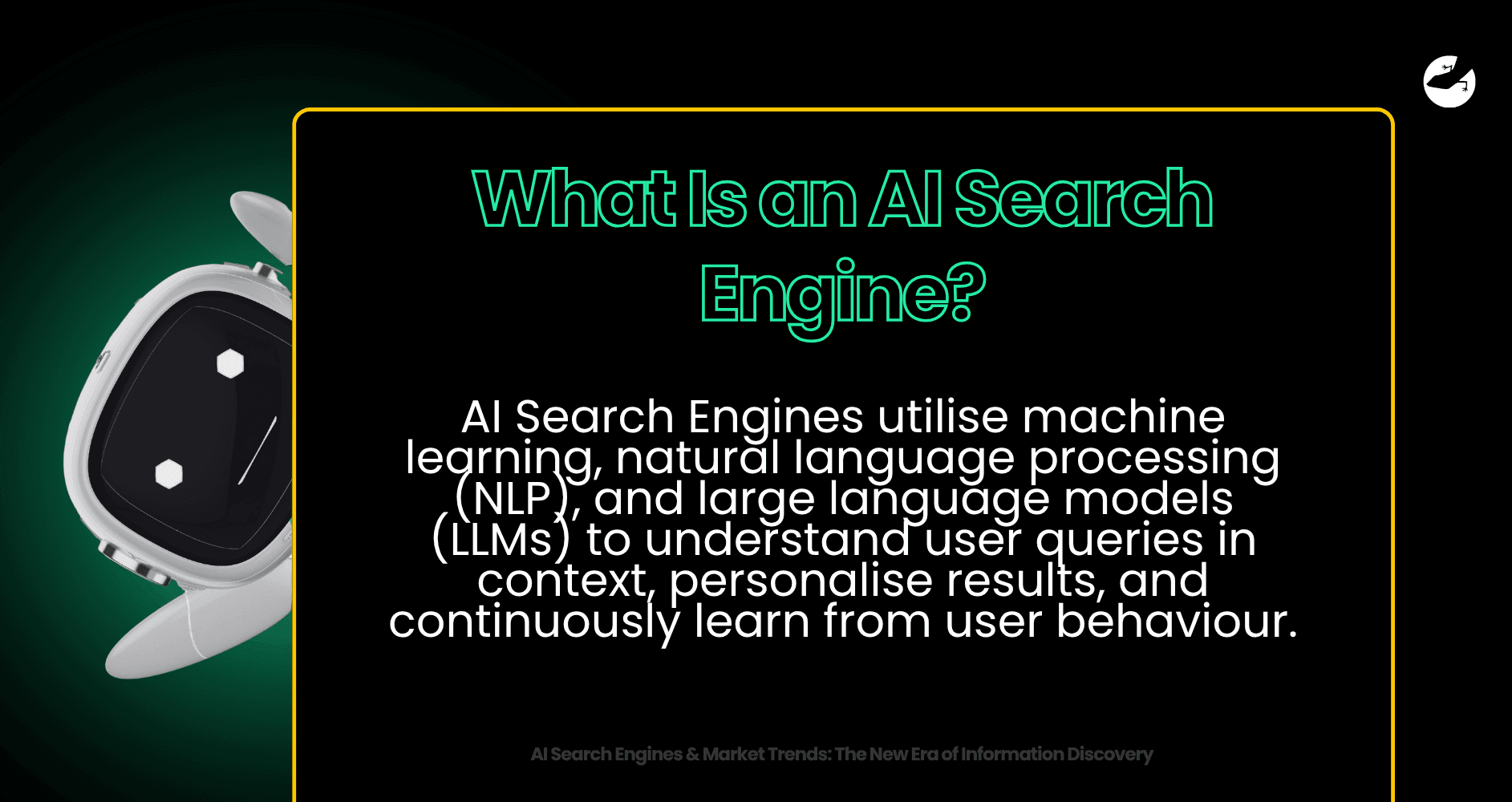
Some of the key capabilities include:
- Semantic Search: Interprets the meaning behind words to deliver more relevant results.
- Conversational Interfaces: Engages users with chatbot-like experiences instead of simple search result lists.
- Personalisation: Tailors results based on user history, preferences, and real-time data.
- Multimodal Search: Allows users to search using voice, images, and videos in addition to text.
These features make AI search engines not just faster—but also significantly smarter.
Key Market Trends in AI Search
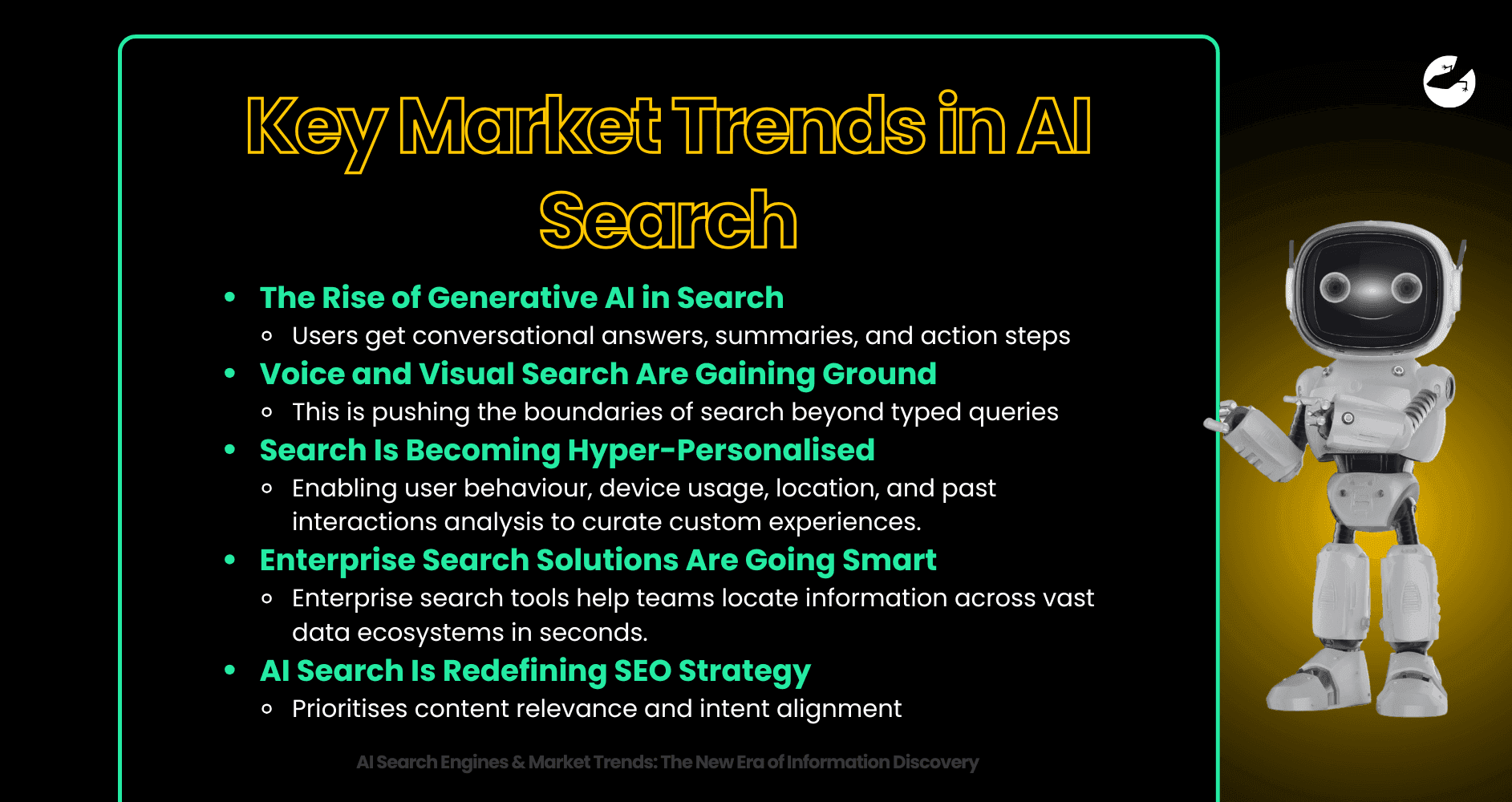
1. The Rise of Generative AI in Search
The integration of generative AI in search, led by tools like ChatGPT and Google’s Search Generative Experience (SGE), is reshaping how users retrieve information. Instead of a list of links, users get conversational answers, summaries, and action steps. This reduces friction and dramatically increases search efficiency.
Implication: Brands need to optimize their content for AI-generated summaries, which means focusing on clarity, context, and structured data.
2. Voice and Visual Search Are Gaining Ground
Voice assistants like Siri, Alexa, and Google Assistant are pushing the boundaries of search beyond typed queries. At the same time, tools like Google Lens are enabling users to search using images.
Implication: Businesses must ensure their digital assets—text, images, videos—are properly indexed and optimised for non-textual searches.
3. Search Is Becoming Hyper-Personalised
AI enables search engines to analyse user behavior, device usage, location, and past interactions to curate custom experiences. Whether you're a returning visitor or a first-time user, the results you see are increasingly tailored.
Implication: Personalised search means brands must maintain consistent, high-quality content across channels and touchpoints.
4. Enterprise Search Solutions Are Going Smart
Within organisations, AI is transforming internal knowledge discovery. Enterprise search tools powered by AI are helping teams locate documents, emails, and insights across vast data ecosystems in seconds.
Implication: Companies need to rethink their internal data architecture and search systems to fully leverage this efficiency.
5. AI Search Is Redefining SEO Strategy
Search Engine Optimisation (SEO)
is evolving alongside AI. Instead of simply focusing on keywords and backlinks, the new SEO landscape prioritises:
- Content relevance and intent alignment
- Structured data for machine readability
- Conversational and long-form content
- Entity-based optimisation (topics > terms)
Implication: Businesses must shift their SEO mindset from keyword stuffing to context-driven content strategies.
How AI Search Is Changing User Expectations
Users now expect instant, accurate, and context-aware results. They no longer tolerate irrelevant links or poor-quality content. AI-powered engines raise the bar by delivering seamless, conversational, and anticipatory search experiences.
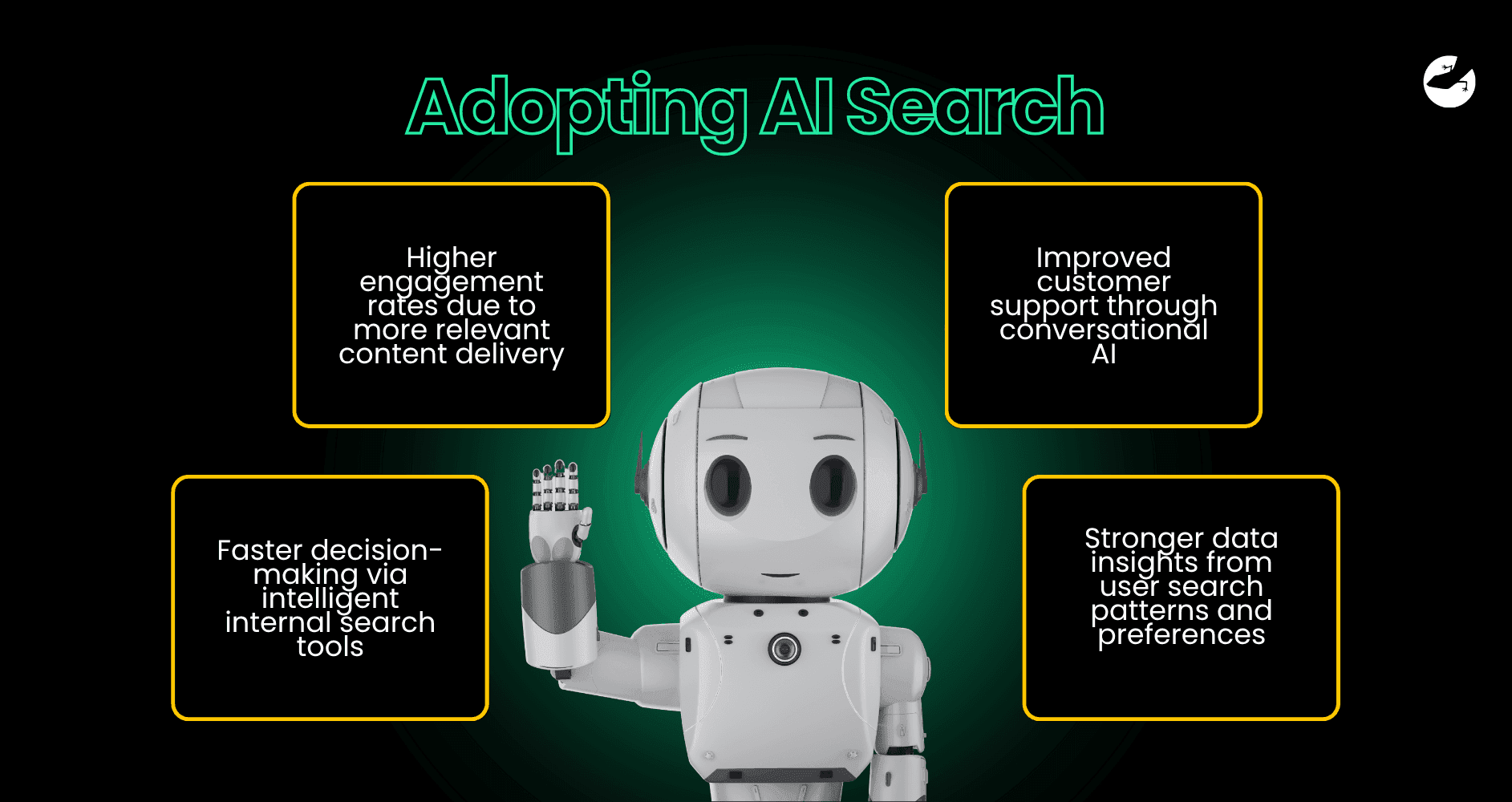
This evolution demands a new approach to digital presence—where businesses must not only be searchable but also meaningful within the AI ecosystem.
The Business Case for Adopting AI Search
The benefits of AI-powered search engines aren’t limited to user experience—they extend deep into business operations:
- Higher engagement rates due to more relevant content delivery
- Improved customer support through conversational AI
- Faster decision-making via intelligent internal search tools
- Stronger data insights from user search patterns and preferences
Industries like eCommerce, healthcare, education, and software development are already seeing measurable improvements in efficiency and satisfaction thanks to AI-enhanced discovery.
Want to find out how much it costs to build your dream app or web app?
What Lies Ahead
As LLMs become more powerful and real-time search capabilities advance, the next chapter in AI search will be defined by:
- Deeper integration with everyday tools (CRMs, dashboards, browsers)
- Predictive search that anticipates needs before a query is made
- Ethical AI frameworks ensuring transparent and unbiased search results
- Multilingual and cross-platform capabilities for global access
Companies that embrace these trends will be better positioned to capture market share and deliver superior user experiences.
How Lizard Global Can Help You Thrive in the AI Search Era
At Lizard Global, we understand that digital transformation goes hand-in-hand with intelligent search and content discovery. Whether you're looking to build a smarter internal platform, optimise your website for AI-driven SEO, or implement next-gen chatbot search features—we have the strategy, design, and development expertise to bring your vision to life.

With our expert team that combines cutting-edge AI capabilities with user-first design thinking to create solutions that scale, adapt, and evolve with your business needs. From intelligent content platforms to enterprise knowledge bases, we build tools that don’t just find information—but unlock its full value.
Ready to navigate the new era of search? Let’s discover what’s possible—together.
Join 2000+ subscribers
Stay in the loop with everything you need to know

AI Search Engines & Market Trends The New Era of Information Discovery
AI search engines are revolutionising how we access, interact with, and interpret digital information. From personalised experiences to generative results and voice-powered queries, explore how this shift is impacting businesses, SEO strategies, and the way users think about search.
The way we search, access, and interact with information is undergoing a radical transformation. Search engines, once reliant on keyword-based algorithms, are now evolving into intelligent systems capable of understanding intent, context, and nuance—thanks to the rise of artificial intelligence (AI). This shift is more than a technological upgrade; it’s a redefinition of how businesses, users, and markets connect to knowledge.
As AI-powered search engines continue to advance, businesses that adapt early can harness competitive advantages through better user experiences, deeper insights, and smarter decision-making.
Here’s how AI is shaping the future of information discovery—and why it matters now more than ever.
What Is an AI Search Engine?
AI search engines go beyond traditional keyword matching. They utilise machine learning, natural language processing (NLP), and large language models (LLMs) to understand user queries in context, personalise results, and continuously learn from user behaviour.

Some of the key capabilities include:
- Semantic Search: Interprets the meaning behind words to deliver more relevant results.
- Conversational Interfaces: Engages users with chatbot-like experiences instead of simple search result lists.
- Personalisation: Tailors results based on user history, preferences, and real-time data.
- Multimodal Search: Allows users to search using voice, images, and videos in addition to text.
These features make AI search engines not just faster—but also significantly smarter.
Key Market Trends in AI Search

1. The Rise of Generative AI in Search
The integration of generative AI in search, led by tools like ChatGPT and Google’s Search Generative Experience (SGE), is reshaping how users retrieve information. Instead of a list of links, users get conversational answers, summaries, and action steps. This reduces friction and dramatically increases search efficiency.
Implication: Brands need to optimize their content for AI-generated summaries, which means focusing on clarity, context, and structured data.
2. Voice and Visual Search Are Gaining Ground
Voice assistants like Siri, Alexa, and Google Assistant are pushing the boundaries of search beyond typed queries. At the same time, tools like Google Lens are enabling users to search using images.
Implication: Businesses must ensure their digital assets—text, images, videos—are properly indexed and optimised for non-textual searches.
3. Search Is Becoming Hyper-Personalised
AI enables search engines to analyse user behavior, device usage, location, and past interactions to curate custom experiences. Whether you're a returning visitor or a first-time user, the results you see are increasingly tailored.
Implication: Personalised search means brands must maintain consistent, high-quality content across channels and touchpoints.
4. Enterprise Search Solutions Are Going Smart
Within organisations, AI is transforming internal knowledge discovery. Enterprise search tools powered by AI are helping teams locate documents, emails, and insights across vast data ecosystems in seconds.
Implication: Companies need to rethink their internal data architecture and search systems to fully leverage this efficiency.
5. AI Search Is Redefining SEO Strategy
Search Engine Optimisation (SEO)
is evolving alongside AI. Instead of simply focusing on keywords and backlinks, the new SEO landscape prioritises:
- Content relevance and intent alignment
- Structured data for machine readability
- Conversational and long-form content
- Entity-based optimisation (topics > terms)
Implication: Businesses must shift their SEO mindset from keyword stuffing to context-driven content strategies.
How AI Search Is Changing User Expectations
Users now expect instant, accurate, and context-aware results. They no longer tolerate irrelevant links or poor-quality content. AI-powered engines raise the bar by delivering seamless, conversational, and anticipatory search experiences.

This evolution demands a new approach to digital presence—where businesses must not only be searchable but also meaningful within the AI ecosystem.
The Business Case for Adopting AI Search
The benefits of AI-powered search engines aren’t limited to user experience—they extend deep into business operations:
- Higher engagement rates due to more relevant content delivery
- Improved customer support through conversational AI
- Faster decision-making via intelligent internal search tools
- Stronger data insights from user search patterns and preferences
Industries like eCommerce, healthcare, education, and software development are already seeing measurable improvements in efficiency and satisfaction thanks to AI-enhanced discovery.
Want to find out how much it costs to build your dream app or web app?
What Lies Ahead
As LLMs become more powerful and real-time search capabilities advance, the next chapter in AI search will be defined by:
- Deeper integration with everyday tools (CRMs, dashboards, browsers)
- Predictive search that anticipates needs before a query is made
- Ethical AI frameworks ensuring transparent and unbiased search results
- Multilingual and cross-platform capabilities for global access
Companies that embrace these trends will be better positioned to capture market share and deliver superior user experiences.
How Lizard Global Can Help You Thrive in the AI Search Era
At Lizard Global, we understand that digital transformation goes hand-in-hand with intelligent search and content discovery. Whether you're looking to build a smarter internal platform, optimise your website for AI-driven SEO, or implement next-gen chatbot search features—we have the strategy, design, and development expertise to bring your vision to life.

With our expert team that combines cutting-edge AI capabilities with user-first design thinking to create solutions that scale, adapt, and evolve with your business needs. From intelligent content platforms to enterprise knowledge bases, we build tools that don’t just find information—but unlock its full value.
Ready to navigate the new era of search? Let’s discover what’s possible—together.
Join 2000+ subscribers
Stay in the loop with everything you need to know
FAQs

How does AI improve search engines?
What are examples of AI search engines?
What is generative search?
How is AI changing SEO?
What industries benefit from AI-powered search?
Is AI search replacing traditional search engines?
Can businesses use AI for internal search?
How do I optimize my website for AI search?
similar reads
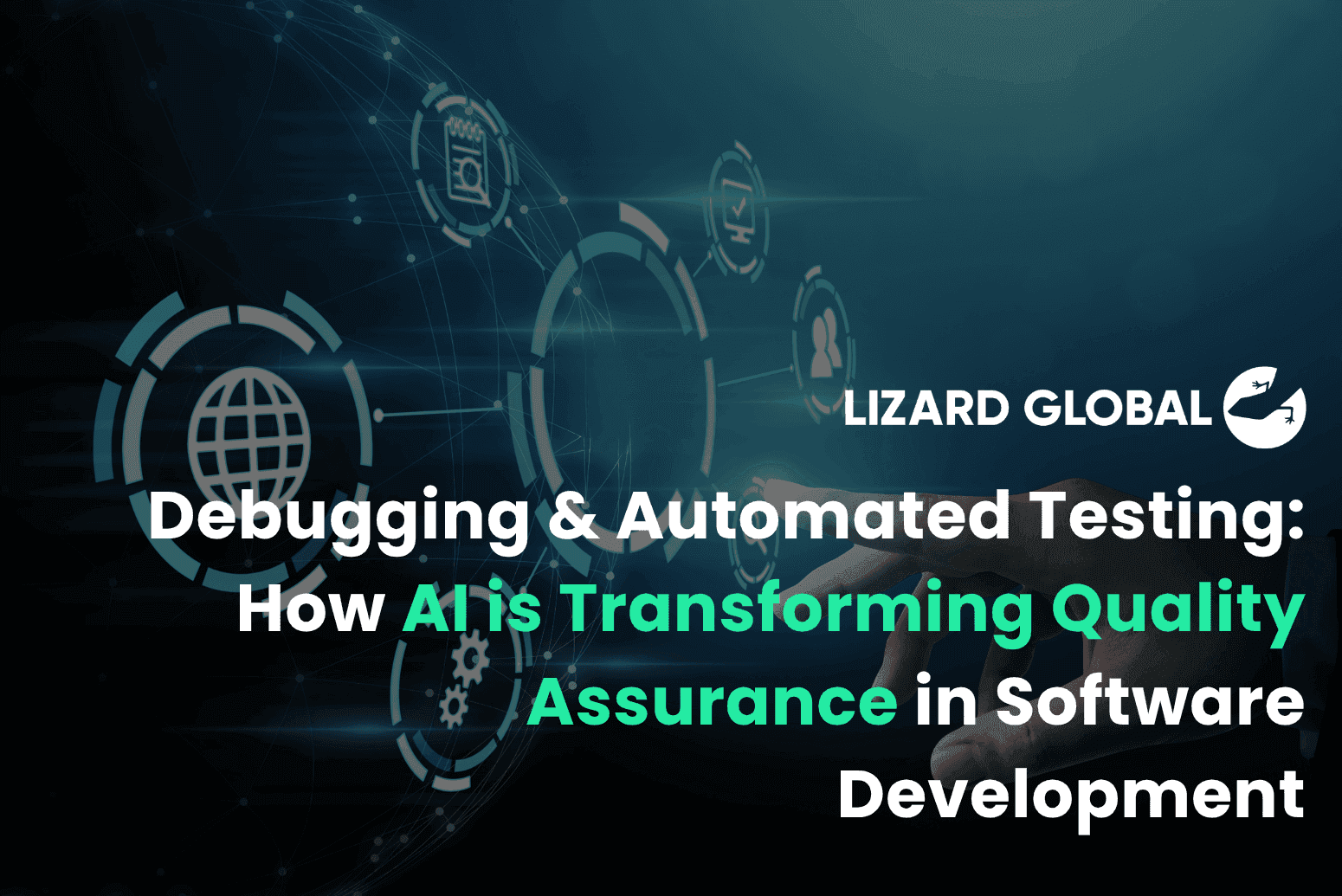
Machine Learning & AI
Quality Assurance
Software Development
Debugging & Automated Testing: How AI is Transforming Quality Assurance in Software Development
15 July 2025
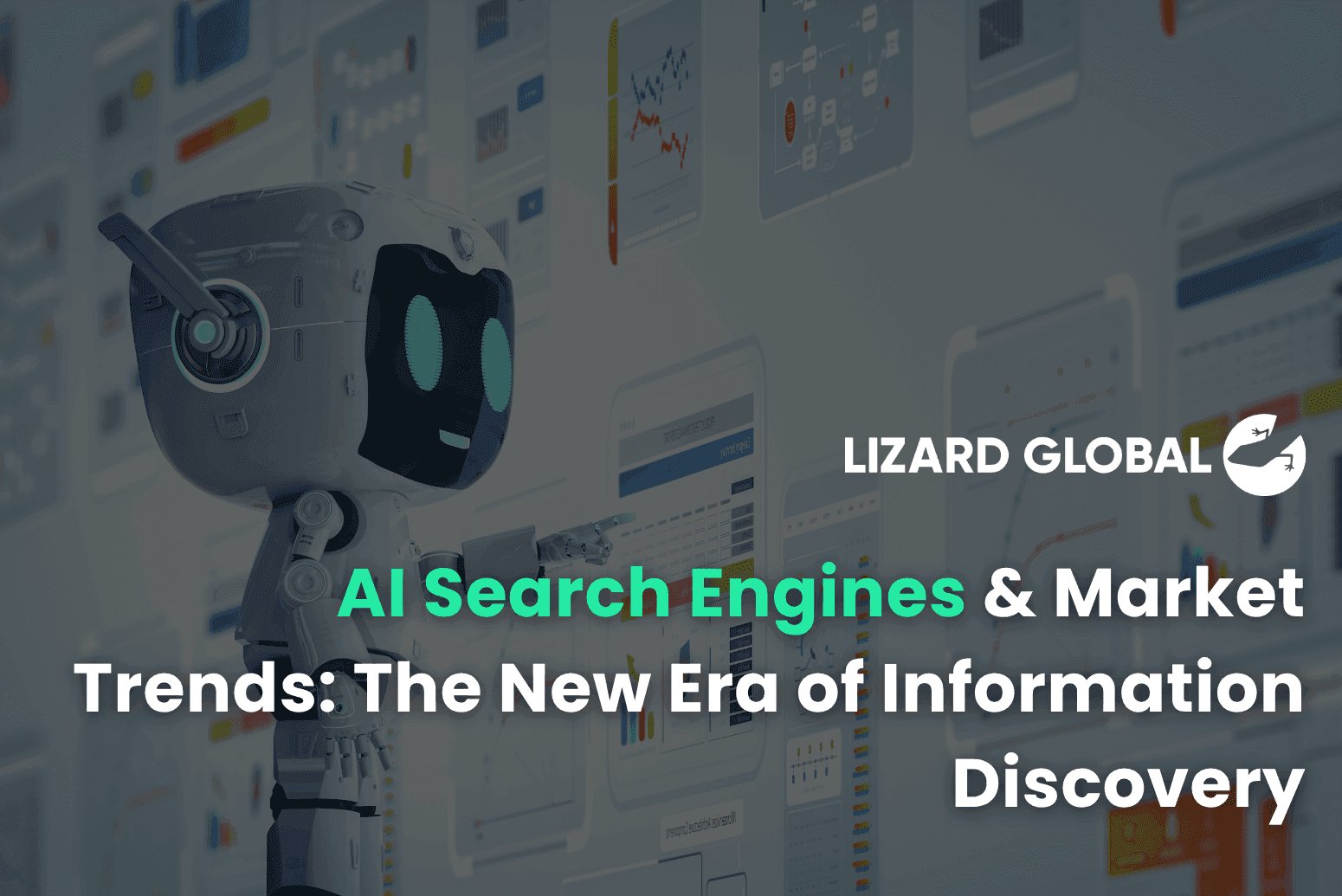
Machine Learning & AI
AI Search Engines & Market Trends: The New Era of Information Discovery
29 July 2025
Machine Learning & AI
AI & Software Development: A Match Made in Silicon
30 June 2025




